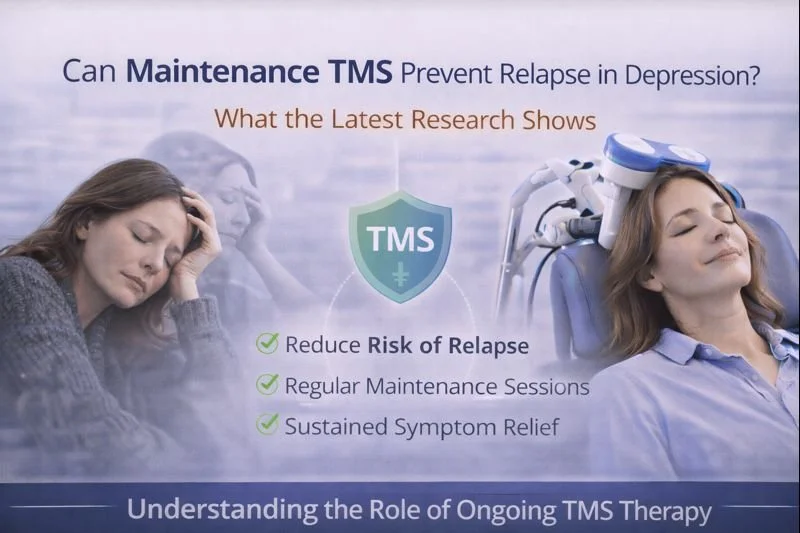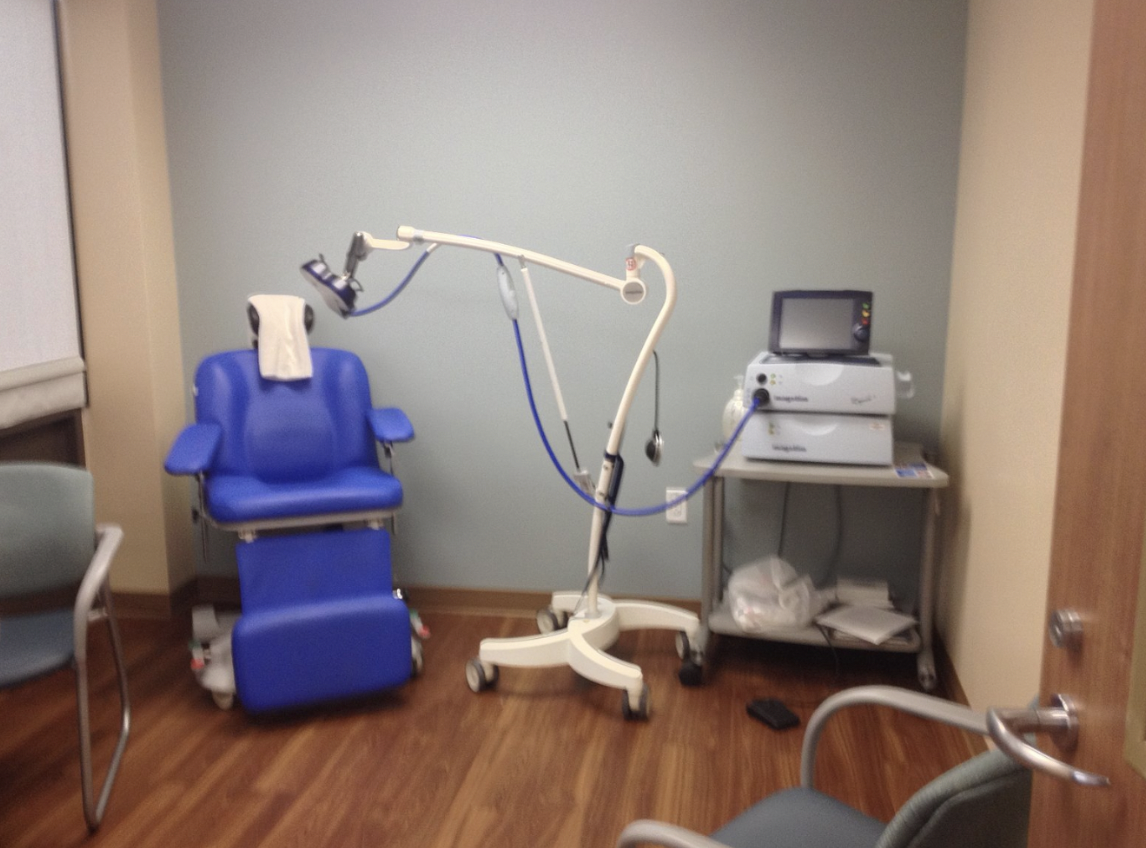Can Maintenance TMS Prevent Relapse in Depression? What the Latest Research Shows
Understanding Maintenance TMS for Depression
If you've undergone Transcranial Magnetic Stimulation (TMS) therapy for depression, you already know how life-changing it can be. But what happens after your initial treatment course ends? For many patients, the fear of relapse is real. This is where maintenance TMS comes into play.
At Dignity Brain Health, located in Brookline and serving patients throughout the Boston area—including Cambridge, Newton, Somerville, and Back Bay—we specialize in helping patients stay depression-free with ongoing, research-backed care.
In this blog post, we'll explore:
What maintenance TMS is and how it works
The latest research on its effectiveness
How Boston-area patients can benefit
Where to get expert care locally
What Is Maintenance TMS?
Maintenance TMS refers to continued, periodic TMS treatments after a patient has completed an initial acute course of therapy. These sessions are less frequent—often weekly or bi-weekly—and aim to sustain the antidepressant effects and prevent relapse.
How It Works
Non-invasive: Uses magnetic pulses to stimulate areas of the brain involved in mood regulation
No systemic side effects: Unlike medications, TMS does not cause weight gain, sexual dysfunction, or sedation
FDA-cleared: Approved for treatment-resistant depression
Why Maintenance Matters
Depression is a chronic condition for many. Studies show that relapse rates can be as high as 50% within the first year after symptom remission (Lye et al., 2020). Maintenance TMS offers a proactive approach to sustain mental wellness.
What Does the Research Say About Maintenance TMS?
Recent studies indicate that maintenance TMS can significantly reduce the risk of relapse.
Key Findings
A 2020 study published in the International journal of physiology found that patients who received maintenance TMS had significantly lower relapse rates at 6- and 12-month follow-ups compared to those who did not (Chang et al., 2020).
Another study by Haesebaert et al. (2016) demonstrated that maintenance TMS, delivered on a tapering schedule, helped sustain remission in patients with major depressive disorder (MDD).
Patients who continued with maintenance TMS reported improved mood stability and less reliance on medication.
Efficacy of Maintenance TMS
Recent research underscores the benefits of maintenance TMS:
Lower Relapse Rates: A study reported that patients receiving maintenance TMS had a significantly lower relapse rate (37.8%) compared to those who did not receive maintenance therapy (81.8%), suggesting a powerful protective effect against returning symptoms (Chang et al., 2020).
Symptom Management: Maintenance TMS has been shown to be a safe and effective option for managing long-term symptoms. A longitudinal follow-up indicated that patients experienced fewer and less severe depressive episodes when on a consistent maintenance schedule, maintaining functional improvement in daily life (Janicak et al., 2022).
Alternative to Medications: For many individuals, maintenance TMS serves as a reliable, non-pharmacological alternative to long-term antidepressant use. This can be particularly valuable for patients who experience intolerable side effects from medications or prefer a more holistic, drug-free treatment approach.
This research supports the idea that maintenance TMS isn't just an optional add-on—it's a strategic part of long-term depression care.
Why Boston-Area Patients Are Turning to Maintenance TMS
Greater Boston is home to world-renowned medical institutions like Massachusetts General Hospital, McLean Hospital, and Beth Israel Deaconess Medical Center. These institutions have contributed significantly to TMS research and patient care standards.
For those living in:
Brookline
Cambridge
Newton
Somerville
Back Bay
...access to top-tier mental health care is within reach.
At Dignity Brain Health in Brookline, we offer:
Personalized maintenance schedules
Collaborative care with local psychiatrists and therapists
A calm, welcoming environment just minutes from public transit
Our clinic is ideally located to serve the entire Boston metro area.
What to Expect During Maintenance TMS
Patients often ask what a maintenance schedule looks like. While it varies by individual, a typical protocol might include:
Weeks 1-4: One session per week
Weeks 5-12: One session every other week
Ongoing: Monthly "booster" sessions or as needed based on symptoms
Sessions last about 20-30 minutes, and most patients return to daily activities immediately afterward.
Who Should Consider It?
Maintenance TMS is ideal for:
Patients with a history of relapse after traditional treatments
Those who experienced significant improvement with initial TMS
Individuals seeking to reduce medication dependency
Internal and External Support Resources
At Dignity Brain Health, we believe in a holistic approach. In addition to TMS, we encourage patients to explore local resources:
Internal Resources
External Boston-Based Support
NAMI Massachusetts: Education and support for families and individuals
Boston Medical Center Psychiatry: Comprehensive care and referral services
McLean Hospital Depression Services: Research and advanced psychiatric services
Location: Visit Us in Brookline, MA
Looking for maintenance TMS therapy near Boston? Our Brookline clinic is centrally located and easily accessible from Cambridge, Newton, Somerville, and Back Bay.
Dignity Brain Health 1180 Beacon St, Suite 7B Brookline, MA 02446
Ready to Take the Next Step?
Don’t wait for symptoms to return. Stay ahead of relapse with maintenance TMS at Dignity Brain Health.
Book Your Consultation Today
Call us at (617) 249-7481 or schedule online.
Have questions? Leave a comment below or contact us—we’re here to help you feel your best.
References
Chang, J., Chu, Y., Ren, Y., Li, C., Wang, Y., & Chu, X. P. (2020). Maintenance treatment of transcranial magnetic stimulation (TMS) for treatment-resistant depression patients responding to acute TMS treatment. International journal of physiology, pathophysiology and pharmacology, 12(5), 128–133., 277, 358-365.
Haesebaert, F., Moirand, R., Schott-Pethelaz, A. M., Brunelin, J., & Poulet, E. (2016). Usefulness of repetitive transcranial magnetic stimulation as a maintenance treatment in patients with major depression. The World Journal of Biological Psychiatry, 19(1), 74–78. https://doi.org/10.1080/15622975.2016.1255353
Lye, M. S., Tey, Y. Y., Tor, Y. S., Shahabudin, A. F., Ibrahim, N., Ling, K. H., Stanslas, J., Loh, S. P., Rosli, R., Lokman, K. A., Badamasi, I. M., Faris-Aldoghachi, A., & Abdul Razak, N. A. (2020). Predictors of recurrence of major depressive disorder. PloS one, 15(3). https://doi.org/10.1371/journal.pone.0230363
—
CONTACT INFO:
DIGNITY BRAIN HEALTH
1101 BEACON STREET, SUITE 8W
BROOKLINE, MA, 02446
UNITED STATES
Phone: (617) 855-7288



